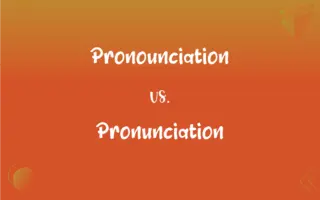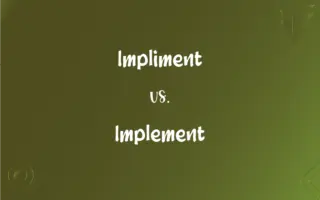Vegatable vs. Vegetable: Mastering the Correct Spelling
Edited by Aimie Carlson || By Janet White || Updated on March 9, 2024
"Vegatable" is incorrect, while "vegetable" is the correct spelling. A vegetable is an edible plant or part of a plant, often consumed as food.

Which is correct: Vegatable or Vegetable
How to spell Vegetable?

Vegatable is Incorrect

Vegetable is Correct
ADVERTISEMENT
Key Differences
Remember that "vegetable" ends with 'able', implying its ability to be eaten.
Think of 'get' in the middle of "vegetable," like 'get' a vegetable.
Visualize 'table' in 'vegetable', as vegetables are often found on a table.
Link 'vege' to 'veggie', a common short form for vegetable.
Associate 'vegetable' with 'vegetation', which shares the first four letters.
ADVERTISEMENT
Correct usage of Vegetable
She tried to plant a vegatable in her garden.
She tried to plant a vegetable in her garden.
Can you please pass me the vegatable cutter from the kitchen drawer?
Can you please pass me the vegetable cutter from the kitchen drawer?
Vegetable Definitions
Cultivated plants eaten by humans other than grains, fruits, or nuts.
The farmer grows a variety of vegetables in his garden.
A plant or part of a plant used as food.
Carrots are a popular root vegetable.
Any plant grown for an edible part that is usually eaten as part of a meal.
Tomatoes, though botanically fruits, are culinary vegetables.
The edible part of plants, like roots, leaves, or stems.
Spinach is a leafy green vegetable high in nutrients.
Edible plants or their parts, typically consumed in savory dishes.
She added several green vegetables to her stir-fry.
A plant cultivated for its edible parts, such as the roots of the beet, the leaves of spinach, the flower buds of broccoli, or the fruit or seeds of certain species, as beans, corn, and squash.
The edible part of such a plant.
A member of the vegetable kingdom, especially a green plant.
Offensive Slang One who is severely impaired mentally and physically, as by brain injury or disease.
Of, relating to, or derived from plants or a plant
Vegetable dyes.
Made from or with edible plants or plant parts
Vegetable lasagna.
Growing or reproducing like a plant.
Any plant.
A plant raised for some edible part of it, such as the leaves, roots, fruit or flowers, but excluding any plant considered to be a fruit, grain, herb, or spice in the culinary sense.
A person whose brain (or, infrequently, body) has been damaged so that they cannot interact with the surrounding environment; a person in a persistent vegetative state.
Of or relating to plants.
Of or relating to vegetables.
Of or pertaining to plants; having the nature of, or produced by, plants; as, a vegetable nature; vegetable growths, juices, etc.
Blooming ambrosial fruitOf vegetable gold.
Consisting of, or comprising, plants; as, the vegetable kingdom.
Plants having distinct flowers and true seeds.
A plant. See Plant.
A plant used or cultivated for food for man or domestic animals, as the cabbage, turnip, potato, bean, dandelion, etc.; also, the edible part of such a plant, as prepared for market or the table.
A person who has permanently lost consciousness, due to damage to the brain, but remains alive; sometimes continued life requires support by machinery such as breathing tubes. Such a person is said to be in a vegetative state.
Edible seeds or roots or stems or leaves or bulbs or tubers or nonsweet fruits of any of numerous herbaceous plant
Any of various herbaceous plants cultivated for an edible part such as the fruit or the root of the beet or the leaf of spinach or the seeds of bean plants or the flower buds of broccoli or cauliflower
Of the nature of or characteristic of or derived from plants;
Decaying vegetable matter
A mineral deposit
Mineral water
Vegetable Sentences
Carrots are my favorite vegetable because they're crunchy and sweet.
I always look for new vegetable recipes to keep meals interesting.
A vegetable stir-fry is a quick and nutritious meal option.
It's fun to explore international cuisines through their vegetable dishes.
The nutritionist recommended increasing my vegetable intake for better health.
Vegetable Idioms & Phrases
Root vegetable
A type of vegetable where the root part is edible, such as carrots or potatoes.
Root vegetables are hearty and perfect for roasting.
Vegetable soup
A soup made primarily with vegetables and often broth.
On cold days, nothing beats a warm bowl of homemade vegetable soup.
A vegetable garden
A garden where vegetables are grown for personal use or sale.
We planted a vegetable garden to grow our own organic food.
Vegetable oil
Oil derived from the seeds or other parts of vegetables, used in cooking.
Vegetable oil is a staple in many kitchens due to its versatility.
Vegetable broth
A broth made by simmering vegetables in water, used as a base for soups and sauces.
Vegetable broth is a healthy and flavorful alternative to meat broths.
Vegetable stir-fry
A dish made by quickly frying vegetables in hot oil, often with sauce and spices.
Vegetable stir-fry is a staple in Asian cuisine and very versatile.
Vegetable platter
A large plate or tray filled with an assortment of raw, cut vegetables, often served with dip.
We served a vegetable platter at the party, and it was a hit.
FAQs
What is the root word of vegetable?
The root word of vegetable is the Latin 'vegetabilis'.
What is the verb form of vegetable?
Vegetable doesn't have a direct verb form; it's primarily a noun.
What is the singular form of vegetable?
The singular form is 'vegetable'.
What is the plural form of vegetable?
The plural form is 'vegetables'.
Which conjunction is used with vegetable?
Conjunctions such as 'and' or 'or' are commonly used with 'vegetable'.
Is vegetable a negative or positive word?
Vegetable is a neutral word; it's neither inherently negative nor positive.
Which preposition is used with vegetable?
Prepositions like 'of', 'with', and 'in' are commonly used with 'vegetable'.
Is vegetable an abstract noun?
No, vegetable is a concrete noun.
Why is it called vegetable?
It's called a vegetable because it comes from the Latin word 'vegetabilis' meaning 'able to live and grow'.
What is the pronunciation of vegetable?
Vegetable is pronounced as /ˈvɛdʒtəbəl/ or /ˈvɛdʒɪtəbəl/.
Which vowel is used before vegetable?
The indefinite article 'a' is typically used before 'vegetable'.
Is vegetable an adverb?
No, vegetable is not an adverb.
Is vegetable a countable noun?
Yes, vegetable is a countable noun.
Is the vegetable term a metaphor?
Vegetable can be used metaphorically in different contexts.
Is the word vegetable imperative?
No, 'vegetable' is not typically used in an imperative form.
What is the opposite of vegetable?
The opposite of vegetable in dietary terms could be 'meat' or 'animal product'.
What is the second form of vegetable?
Vegetable, being a noun, does not have a second form.
How many syllables are in vegetable?
There are four syllables in 'vegetable'.
How do we divide vegetable into syllables?
Vegetable is divided as veg-e-ta-ble.
What is a stressed syllable in vegetable?
The stressed syllable in 'vegetable' is the first one: 'veg'.
What part of speech is vegetable?
Vegetable is primarily a noun.
Is vegetable a noun or adjective?
Vegetable is primarily a noun, but can be used as an adjective in contexts like 'vegetable soup'.
What is another term for vegetable?
Another term could be 'greens' or 'produce'.
What is the first form of vegetable?
As a noun, vegetable does not have a first form like verbs do.
What is the third form of vegetable?
As a noun, vegetable does not have a third form.
How is vegetable used in a sentence?
Example: "Eating a variety of vegetables is key to a healthy diet."
Which article is used with vegetable?
Both 'a' (indefinite) and 'the' (definite) are used with 'vegetable'.
Is vegetable a vowel or consonant?
The term 'vegetable' is neither a vowel nor a consonant; it's a noun.
Is vegetable a collective noun?
No, vegetable is not a collective noun.
Which determiner is used with vegetable?
Determiners like 'the', 'a', 'some', or 'this' can be used with 'vegetable'.
About Author
Written by
Janet WhiteJanet White has been an esteemed writer and blogger for Difference Wiki. Holding a Master's degree in Science and Medical Journalism from the prestigious Boston University, she has consistently demonstrated her expertise and passion for her field. When she's not immersed in her work, Janet relishes her time exercising, delving into a good book, and cherishing moments with friends and family.
Edited by
Aimie CarlsonAimie Carlson, holding a master's degree in English literature, is a fervent English language enthusiast. She lends her writing talents to Difference Wiki, a prominent website that specializes in comparisons, offering readers insightful analyses that both captivate and inform.


































































